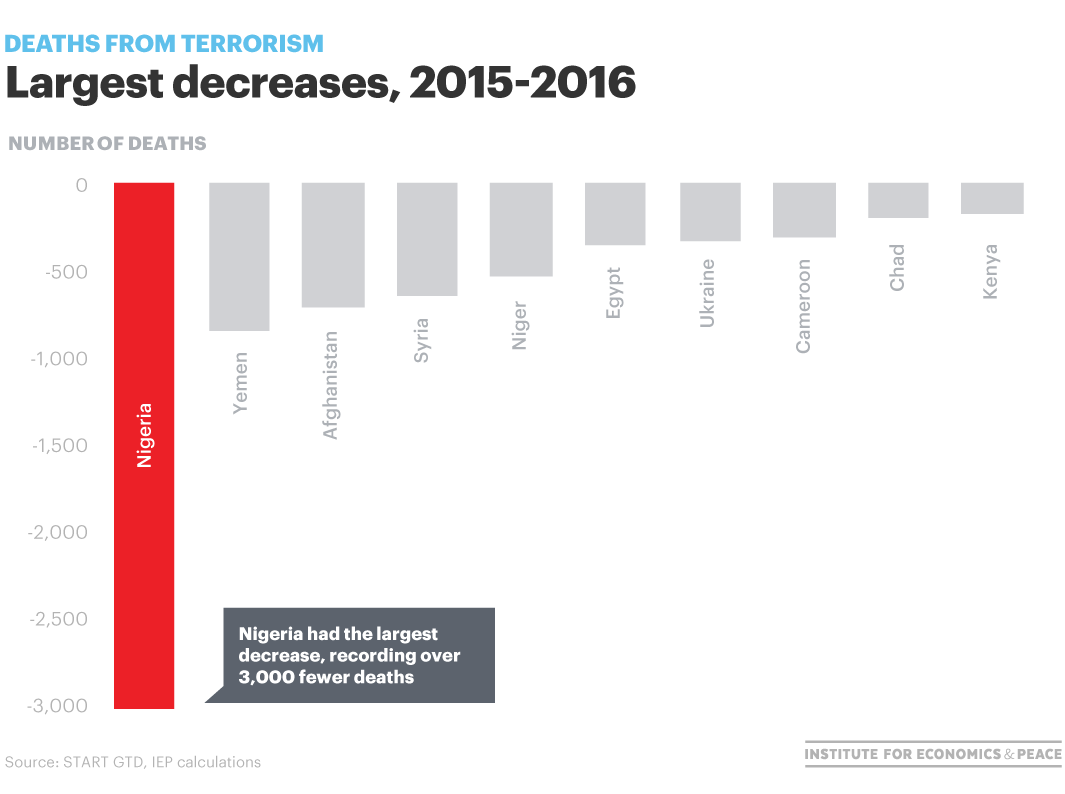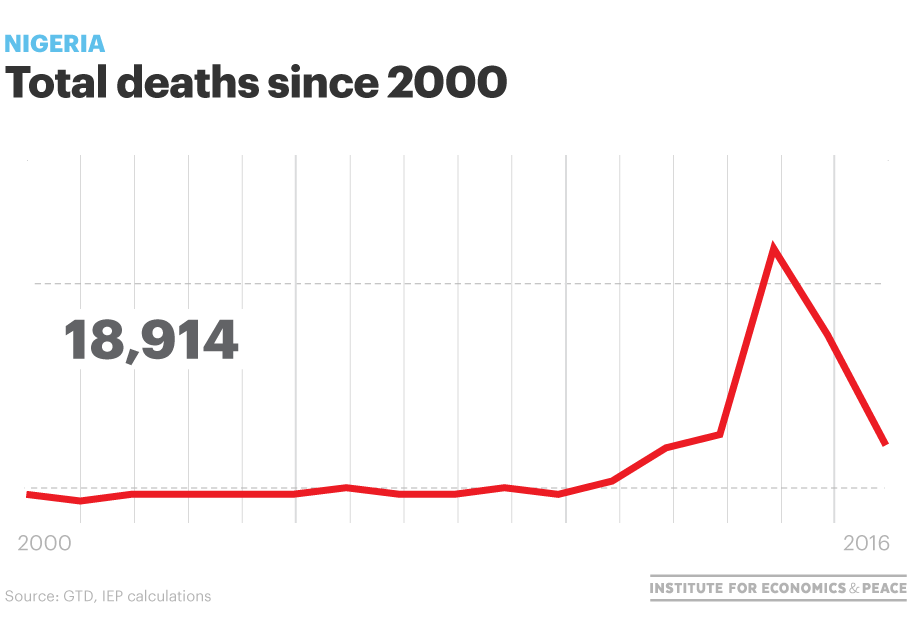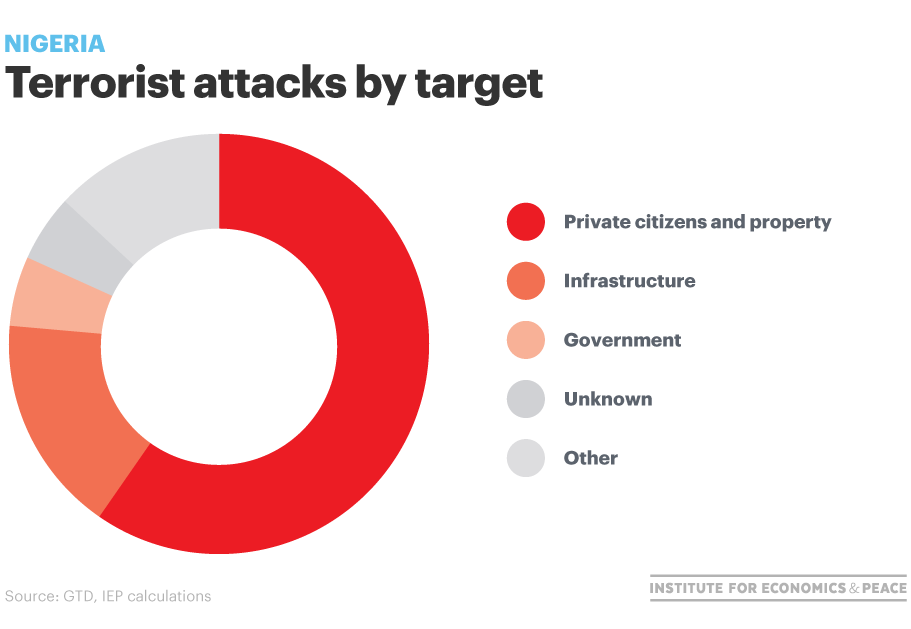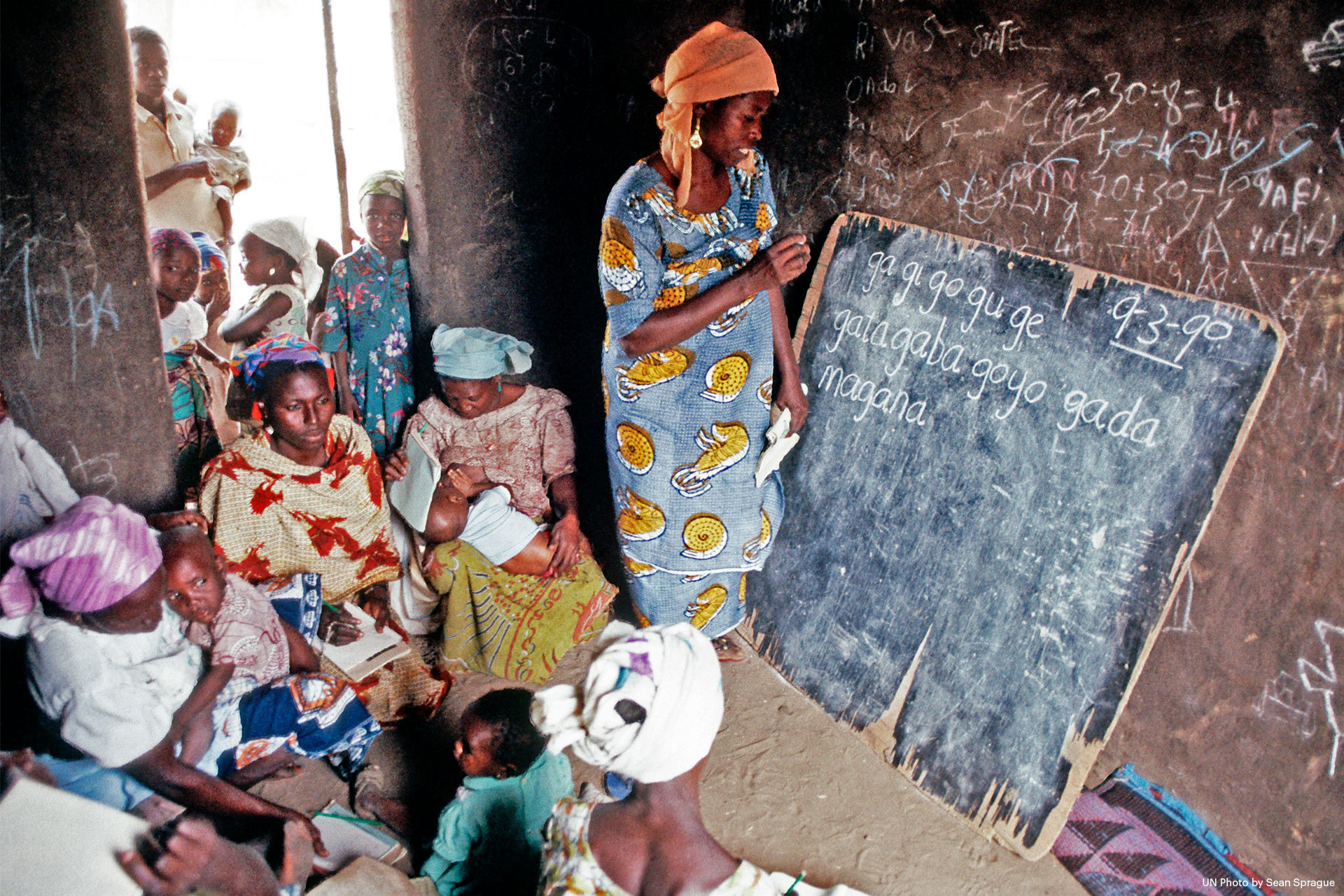Today’s release of the 2017 Global Terrorism Index highlights welcome news for Nigeria. The sub-Sahara African nation has been beleaguered by the activity of Boko Haram. The group, which has been active since 2002, became infamous globally following the abduction of 276 schoolgirls from Chibok in 2014. Yet, as the index highlights, the group’s capacity has since been severely curtailed following numerous military defeats at the hands of the Multinational Joint Task Force; which includes forces from Benin, Cameroon, Chad, Niger and Nigeria and assistance from the United States. This military intervention has seen the group spilled into three factions; two of which are reported to be negotiating with the Nigerian Government to oust the remaining and more violent faction. As a direct result of this, in 2016 Boko Haram was responsible for 61 percent fewer attacks, which has resulted in 80 percent fewer deaths when compared to the previous year. Boko Haram’s decline is also having a positive ripple effect on neighbouring countries with Cameroon, Chad and Niger collectively recording 75 percent fewer terrorism deaths.

Boko Haram’s decline is extremely significant. The group’s presence and terrorist activity has directly constrained the prospects of lasting peace in not only Nigeria but in neighbouring countries. It has also limited Nigeria’s and the broader region’s economic potential as there are huge direct and indirect economic costs to terrorism. Attacks, including bombings and kidnappings carry a direct cost. This is borne by the victims and governments through increased expenditure such as associated medical costs. However, there is also a significant indirect cost as a result of lost productivity and earnings as well as the psychological trauma to the victims, their families and friends. In Nigeria, the cost of violence, including terrorism is estimated at around $600 per capita, according to the Goal 16 Progress Report.

This is why the decline of Boko Haram marks a milestone moment for Nigeria. It presents the opportunity for Nigeria to transition from a peace that is defined by an absence of violence to a state of Positive Peace. Through the joint taskforce, Nigeria and its neighbouring countries have invested heavily in suppressing Boko Haram. This investment has paid dividends with 675 Boko Haram fighters neutralised, 566 presumed members arrested, over 30 training and bomb-making facilities shut down and over 4,500 hostages rescued. Nigeria now has a window of opportunity to invest in the Pillars of Positive Peace that will help bring about lasting peace. By investing in holistic and systemic improvements in the attitudes, institutions and structures that create peaceful societies, Nigeria can transition from a country that has contained violence to a country rich in Positive Peace.
This approach can be challenging to implement in underdeveloped countries where there are competing needs for government and business investment. However, earlier this year, the Institute for Economics & Peace (IEP), which also publishes the Global Terrorism Index, identified the critical areas of investment.
Related Article: MAKING THE CRISIS CONNECTION: GLOBAL SECURITY, THE ENVIRONMENT AND CLIMATE
According to the Positive Peace Report 2017, there is a strong correlation with four of the eight pillars of peace for low peace countries. For mid peace countries, there is a correlation with six of the pillars. In the case of Nigeria, these correlations highlight the importance of investing in measures to address corruption, the functionality of government, good neighbourly relations and the acceptance of the rights of others.
However, this does not mean that Nigeria should ignore the remaining pillars (high levels of human capital, the equitable distribution of resources, the free flow of information and the development of a sound business environment). It has been firmly established that investment in all eight pillars is required to attain lasting Positive Peace. The analysis highlights a framework for policymakers to understand how investments may be targeted while also illustrating the correlation between areas of investment seeing as some pillars are more critical at different stages of peace.
 In the case of Nigeria, the Positive Peace Index ranked the sub-Sahara nation as 141 out of 163 countries. This low score highlights the need for investment in all eight pillars but as highlighted by the analysis, Nigeria may benefit from a more targeted focus on the four factors that correlate with low peace countries. This targeted investment may also assist Nigeria attain the UN Sustainable Development Goals, which, if realised, would help sustain lasting Positive Peace for the estimated 190 million Nigerians, who have lived with the threat and bared witness to the atrocities of Boko Haram for too long.
In the case of Nigeria, the Positive Peace Index ranked the sub-Sahara nation as 141 out of 163 countries. This low score highlights the need for investment in all eight pillars but as highlighted by the analysis, Nigeria may benefit from a more targeted focus on the four factors that correlate with low peace countries. This targeted investment may also assist Nigeria attain the UN Sustainable Development Goals, which, if realised, would help sustain lasting Positive Peace for the estimated 190 million Nigerians, who have lived with the threat and bared witness to the atrocities of Boko Haram for too long.
To access interactive maps on the Global Terrorism Index and to view the full report go to http://visionofhumanity.org.










